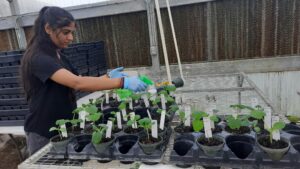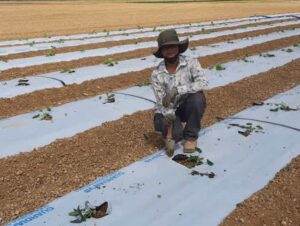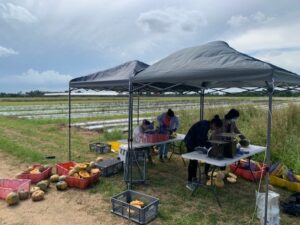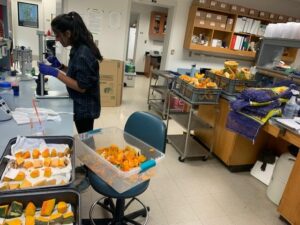Prerna Sabharwal is a graduate student working on her Ph.D. in the Department of Horticultural Sciences at the University of Florida. Her major Professor is CucCAP Squash breeder, Dr. Geoffrey Meru. The focus of Prerna’s research includes plant breeding, plant pathology, and genomics.
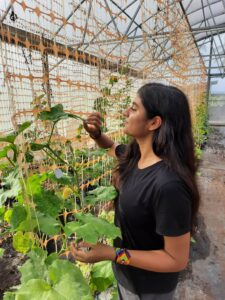
Prerna in TREC Bubblehouse.
Introduce yourself—your background, where you are now, and your current research focus.
I am from Haryana, India. I did my bachelors in Biological Sciences and master’s in Plant Biotechnology. I am a Ph.D. student in Dr. Geoffrey Meru’s Cucurbit breeding and genetics lab, Tropical Research and Education Center (TREC), University of Florida. My Ph.D. project aims to elucidate the genetic mechanism underlying resistance to powdery mildew (Podosphaera xanthii), a major production-limiting disease in summer squash (Cucurbita pepo), in the US and worldwide. I am also working on evaluating the Tropical Pumpkin (Cucurbita moschata), also known as Calabaza, for its yield and horticultural traits in Florida.
Why did you choose to work with Cucurbits, plant breeding, plant pathology, genomics, horticulture, agricultural economics or crop production?
I developed a keen interest in plant genetics during my master’s, especially in plant breeding and plant-disease resistance. When I got the chance to work on squash disease resistance to powdery mildew, I was extremely happy. Squash or pumpkins comes in different shapes, sizes, and colors. From performing pollinations, phenotyping the disease severity, and making crosses among different varieties, I have realized the importance of developing a disease-resistance variety to battle yield loss that affects the economy of crop production and farmers.
What do you hope to accomplish during your time working on the CucCAP grant, and what do you most look forward to in this position?
Through my current position as a Ph.D. student, I hope to achieve success in my project of identifying and developing powdery mildew-resistant squash varieties. I also want to learn in-depth about the world of plant breeding and gain an overall perspective of this field.
Please provide a brief description of your research.
My research project involves screening squash germplasm for resistance to powdery mildew. Integrated pest management (IPM) of powdery mildew includes routine fungicide applications, which are costly. Deployment of host resistance could complement IPM for powdery mildew. My work involves screening hundreds of summer squash germplasm, phenotyping them, and then conducting genomics study to develop markers for resistant genes, which can be used for the development of new squash varieties. These varieties will help farmers reduce their reliance on synthetic fungicides, thus reducing the environmental impact and increasing profitability.
What is your favorite crop plant disease?
My favorite plant disease is powdery mildew caused by Podosphaera xanthii. It is a fungal disease that appears as white powder over the leaf surface (hence the name powdery mildew). This disease can lead to compromised photosynthesis and chlorosis, leading to necrosis—this premature loss of foliage results in reduced yields.
Do you have any social media handles?
- Inoculating watermelon seedlings with Powdery Mildew.
- Prerna at TREC field transplanting Calabaza for evaluation 2023.
- Meru Team Evaluating Calabaza at the TREC field in 2022.
- Taking brix index values for different Calabaza cultivars.
